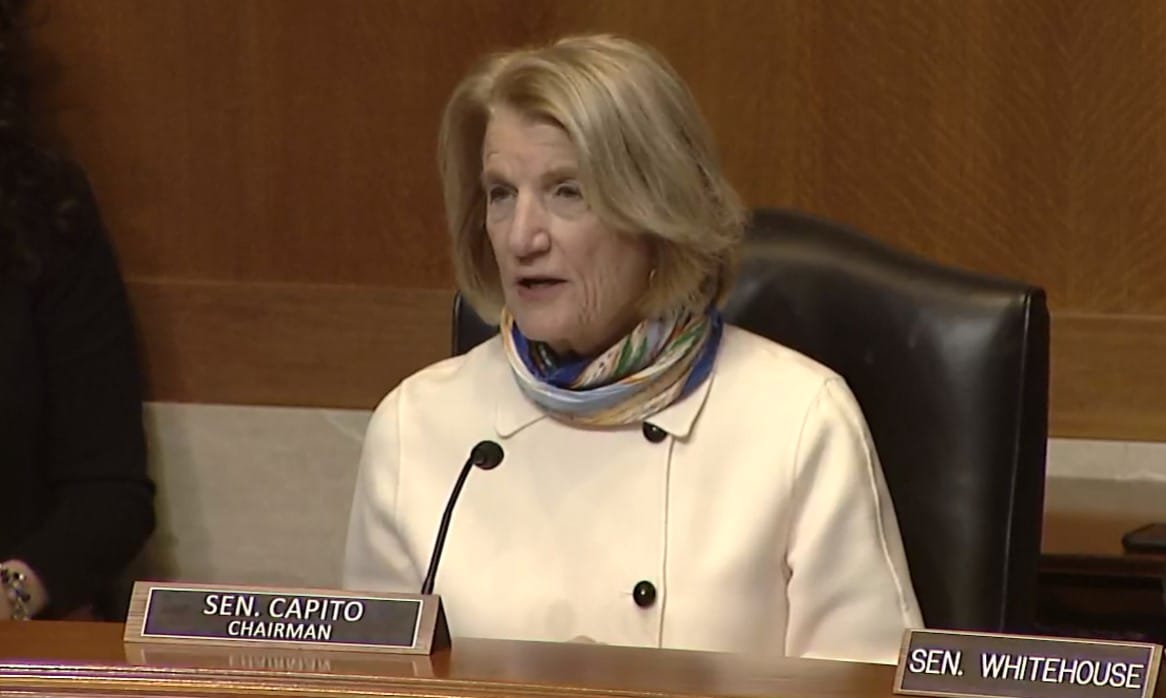Senators Agree Permitting Deadlock Threatens Infrastructure Boom
Lawmakers clashed over NEPA reforms as they warned regulatory delays could stall billions in clean energy and broadband projects.
Jericho Casper

WASHINGTON, Feb. 19, 2025 – Lawmakers sparred Wednesday over how to reform federal permitting processes to address delays in environmental reviews that impact infrastructure projects and the economy.
During a hearing of the Senate Environment and Public Works Committee, lawmakers from both parties agreed that the current permitting process was too slow and unpredictable for critical projects. But, their approaches diverged along partisan lines – particularly regarding changes to the National Environmental Policy Act, a bedrock environmental law that Republicans blame for years-long project delays.
“West Virginia water line extension, broadband projects, bridge replacements have all faced federal permitting delays. And I'm sure my state is not unique,” Committee Chair Sen. Shelley Moore Capito, R-W.V., said in opening remarks. “Too often, lawsuits and regulatory uncertainty delay critical projects that should be moving forward. We need real reforms to fix this.”
The Trump White House estimated in 2020 that infrastructure permitting delays would cost the U.S. economy up to $3.7 trillion in lost GDP by 2025, with projects often facing delays of five to ten years due to duplicative reviews and litigation.
According to an analysis conducted by the Council on Environmental Quality, litigation against NEPA approvals delays projects by an average of 4.5 years, with thousands of lawsuits filed annually — making NEPA the most litigated environmental statute in the U.S. One study found that 24% of transmission projects that completed environmental review still faced legal challenges.
Despite lawsuits delaying projects for years, most of these legal challenges ultimately fail – with agencies, like the Environmental Protection Agency, Army Corps of Engineers, or Department of the Interior, successfully defending their decisions in court about 88% of the time.
Capito and other Republicans framed permitting reform as an economic necessity, calling for: expanding categorical exclusions to allow more projects to bypass full environmental reviews; stronger time limits on approvals; and, narrowing the scope of judicial review for NEPA challenges.
“Let me be clear, modernizing these processes does not mean cutting corners or weakening environmental and public health protections,” Capito said. “It means making the processes more efficient, more predictable and more transparent, so that the processes are not stuck in bureaucratic purgatory or endless legislation.”
Democrats agreed that the permitting process should be more efficient. Ranking Member Sen. Sheldon Whitehouse, D-R.I. warned permitting issues could lead to energy shortfalls, especially as the rise of AI and quantum computing fuels unprecedented.energy demand.
“We need to build out a grid to meet current and future demand. 70% of transmission lines are more than 25 years old, and showing their age. We need to build and fast, right now,” Whitehouse said. “Thousands of electricity generation projects are awaiting approval to connect to the grid. Millions of engineering construction and manufacturing jobs stalled in part because of our inability to build transmission lines. This must change.”
 Broadband BreakfastJericho Casper
Broadband BreakfastJericho Casper
Still, Democrats argued judicial review was necessary to prevent harmful projects from being rushed through. They maintained NEPA was not the biggest barrier, but other factors like interagency coordination and funding shortfalls were. They also pushed for prioritizing transmission infrastructure for renewable energy.
 Broadband BreakfastJericho Casper
Broadband BreakfastJericho Casper
Broadband infrastructure projects, particularly those receiving funding, under the $42.5 billion Broadband Equity, Access, and Deployment program face similar permitting obstacles. In addition to NEPA reviews, they’re subject to the National Historical Preservation Act— which requires consultations with state and tribal historic preservation offices.
 Broadband BreakfastDavid B. McGarry
Broadband BreakfastDavid B. McGarry
Unlike BEAD, broadband programs under the American Rescue Plan Act and the Capital Projects Fund were not subject to NEPA and NHPA reviews. This inconsistency has led some state officials to push for similar exemptions for BEAD projects, with some calling for a future Republican administration to roll back environmental rules.
These hurdles will have to be faced before providers break ground on multi-billion investments in fiber infrastructure under the Bipartisan Infrastructure Law. According to an analysis by Keynesian Technology, these investments in high-speed internet infrastructure were projected to expand U.S. GDP by $146 billion over five years.









Member discussion